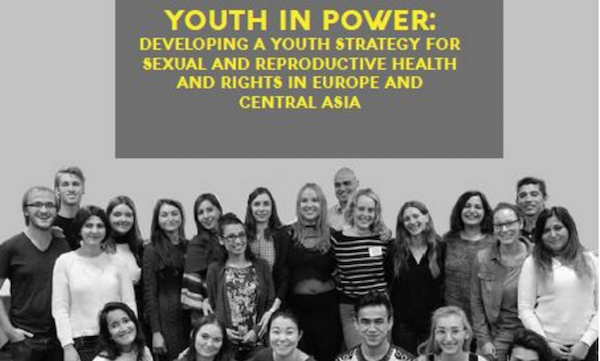
YouAct, in partnership with ASTRA Youth, PETRI-Sofia, Y-PEER, and YSAFE launched a project in 2016 aiming to develop a strategy on sexual and reproductive health and rights (SRHR), by youth, for youth. This initiative was supported by the Council of Europe’s European Youth Foundation (EYF), UNFPA Eastern Europe and Central Asia Regional Office (UNFPA EECARO) and the International Planned Parenthood Federation European Network (IPPF-EN).
The project’s overall aim was to develop a Joint Youth Strategy based on the input, experience, needs and ideas of young people in Council of Europe and Central Asian countries, which will serve as an advocacy and awareness-raising tool on SRHR of young people on the national, regional, and international level.
Arising from this, we are happy to officially launch the “Youth in Power” Strategy, which you can find here.
Young people expressed their perspectives on the current gaps and challenges and their recommendations regarding the realisation of SRHR for young people in the region through an online questionnaire filled out by over 1,000 young people from all over Europe and Central Asia. Youth representatives from over 15 countries gathered in Kiev, Ukraine, in December 2016 to analyse the results and to develop a strategy based on them.
The strategy is intended to serve as an advocacy tool for young people and stakeholders who are active in the field of SRHR, and as a guiding document for NGOs and governments. The findings and recommendations can be summarised as follows:
Comprehensive Sexuality Education (CSE)
– 58.5% of respondents would like to receive more information on SRHR from schools / universities and from the health-care providers,
– 61.9% of respondents would like to receive more information on emotions and emotional development,
– 75.6% of respondents would like to be involved in the drafting of policies and legislation about the sexual and reproductive health and rights of young people at national level.
Recommendations: By 2025, CSE will be incorporated into the curricula of 50% of schools and universities in accordance with the minimal international frameworks. Youth will be involved in the development of CSE materials. Funding and capacity of NGOs and CSOs providing information on CSE in rural areas will be increased. Websites on CSE supported by governments and in line with recommendations from experts and young people will be established. The number of educators receiving training on the delivery of CSE and SRH will increase to 20%.
Legislation
The legislative areas most in need of improvement, with the active participation of young people in the process, are:
– Decriminalisation of abortion,
– Marriage equality,
– Legal regulation of the right of adoption for same sex couples, and
– The drafting of a national strategy on the sexual and reproductive health and rights of young
people.
Recommendations: Legislation and policies will be developed/improved on implementing mandatory CSE in the frameworks of formal education by 2025. Mechanisms to monitor legal procedures on the implementation of CSE will exist by 2025. The age of consent for accessing SRH services will be decreased to 14. National strategies, including for Sexual and Reproductive Health and Rights
and CSE, will be developed by 2025, where young people are involved in the development of such strategies.
SRHR services
Many respondents indicated that they did not know who to turn to for information on safe abortion or relationships, or for advice in cases of sexual bullying. They identified the provision of youth-friendly SRHR services, free contraceptives and SRHR services without requiring parental consent as the most important areas that needed improvement.
Recommendations: Access to contraceptives will increase to at least 50% of the population disaggregated according to, but not limited to age group, gender, ethnicity, nationality. Nationwide campaigns on SRH that are based on international standards will be launched by 2025.
Youth participation in decision-making processes
Over 60.3% of the respondents in the English language version of the survey think that the needs and
opinions of young people in their country are not/not at all taken into consideration in the shaping of policies and legislation, and this figure was elevated for LGBTQI youth or youth with disabilities.
Recommendations: Working groups on initiatives and national programs related to youth health issues will consist of at least 20% young people by 2025. The processes of drafting and adopting policies and laws will include a step providing young people with the option of open consultations on said policies and laws. Educational programmes on decision-making processes and on the importance of youth participation in such processes will be developed.
If you would like to receive more information feel free to contact: youthinpowerproject@gmail.com or follow us on Facebook. Please share this within your networks to create awareness and raise the voice of young people in the region.
SOURCE: Youth in Power Joint Strategy on SRHR, 30 March 2017



